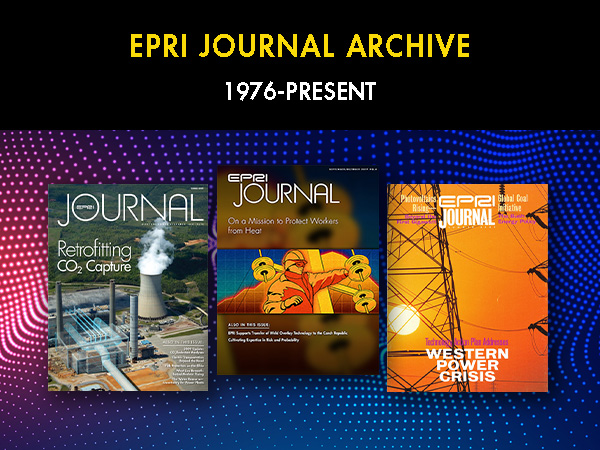Drawing on the latest research, EPRI U has launched 13 new courses on aging management in nuclear plants.
Drawing on the latest research, EPRI U has launched 13 new courses on aging management in nuclear plants. Available in several new formats, the courses provide nuclear plant operators, engineers, and technicians with accessible, practical training covering fundamentals of aging management, concrete aging degradation mechanisms, selective leaching, radiation of concrete, and more. As the industry replaces retiring long-term employees, EPRI U’s more than 20 aging management courses provide a cost-effective way for the emerging workforce to come up to speed quickly and efficiently.
In the United States, a growing number of nuclear plants seek to extend their operating licenses from 60 to 80 years. “A dozen plants have submitted proposals to the U.S. Nuclear Regulatory Commission to do that, and there are more interested,” said EPRI Senior Program Manager Sherry Bernhoft.
To support continued safe, reliable operations to 80 years, plants need rigorous aging management programs. Decades of EPRI research in aging management address such issues as impacts of extended operations on concrete, cabling, and other plant materials and components—with practical applications for plant technicians.
The 13 new courses are either completely new or revised. Collaboration drove the effort to update courses and select new topics and content. “Based on input from nuclear power utilities, we added courses such as radiation of concrete,” said EPRI Senior Technical Leader Emma Wong. “We updated our fundamentals of aging management course for U.S. and international students.”
With the help of 90 employees at 7 utilities, EPRI piloted the new and revised courses, refining their content based on student feedback. For example, participants said that the courses on aging mechanisms of various materials needed more practical information that can help plant staff identify indications of aging. The result: EPRI created a new course, “Visual Identification of Aging Degradation.”
EPRI created concise, user-friendly field guides that plant personnel can download and use to identify signs of plant aging, such as cracks in concrete. These offer accessible alternatives to technical manuals. “Think of it as a little book of phrases that you need to know about aging,” said Wong. “It’s meant to be a guide that plant staff can keep in their pocket and consult for answers just before performing maintenance and other plant-related tasks.”
Some courses are delivered through “distance learning.” “That means that the instructor and students are in different locations, and they communicate through a computer portal,” said Tina Taylor, senior director for research and development in EPRI’s Nuclear sector. “Some people are surprised that you can run a course with this format and still have breakout groups and opportunities for students to ask questions.”
In other courses, students travel to an EPRI office for instruction, or EPRI instructors travel to a utility to teach. On-demand computer-based training is available for some courses and is being expanded in 2020. Students’ feedback prompted EPRI to divide 8-hour computer-based courses into two 4-hour classes on consecutive days, so that participants can cover both the EPRI training and their regular work in a given day.
One U.S. utility requested on-site delivery of all the revamped aging management courses for the entire staff of a nuclear plant. Participants were a mix of new and experienced engineers, program managers, and contractors, with some attending those materials courses relevant to their jobs and others attending all the courses. The courses spurred productive discussions among employees from different departments, prompting enhanced collaboration.
To provide additional support for nuclear plant technicians, Wong is leading the development of an aging management digital assistant application for mobile devices. “Users will have instant access to a large library of reference component photos and links to documents such as EPRI technical reports,” said Wong. “Users can take photos of equipment, and the assistant will analyze them for indications of degradation and provide insights on possible causes along with suggestions for addressing the degradation.”
EPRI U: Aging Management Courses
*Fundamentals of Aging Degradation and Management
*Metals Aging Degradation Mechanisms
*Concrete Aging Degradation Mechanisms
*Polymers Aging Degradation Mechanisms
*Protective Coatings Aging Degradation Mechanisms
*Electrical Equipment Degradation Mechanisms
*Selective Leaching Training
*Radiation of Concrete
*Fundamentals of Managing Aging Programs USA
*Fundamentals of Managing Aging Programs International
*Electronic and I&C Equipment Degradation Mechanisms
*Visual Identification of Aging Degradation
*Integrated Life Cycle Management
Low-Voltage Cable Aging Management Training
Cable Aging Management—Visual/Tactile Assessment
Cable Aging—Adverse Environment
Alkali Silica Reaction Introduction Training
Alkali Silica Reaction—Detection and Confirmation
Alkali Silica Reaction—Evaluating and Managing Impacts
Alkali Silica Reaction—Developing an Aging Management Program
*New or updated course
Key EPRI Technical Experts:
Sherry Bernhoft, Emma Wong, Tina Taylor
For more information, contact techexpert@eprijournal.com.

